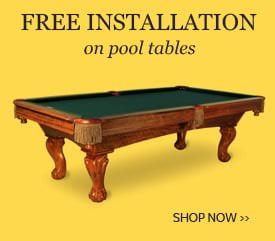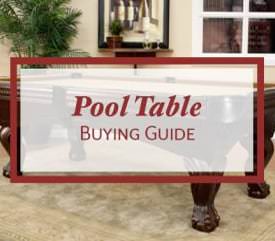How To Choose A Cue Stick
Most beginners to the game of pool use bar and pool hall sticks rather than make an investment in a personal cue stick. When you are just learning to play, the stick is less important than the development of a smooth stroke and a careful aim. The stick will not make the game; the player imbues the cue with his or her own talent and abilities. And, as you develop your game, you will have a better idea of what you want and need in your personal cue. A caveat to that; make sure the cue you use is straight and has a good tip; the best players will be thrown off by a warped cue.
TO CHECK FOR STRAIGHTNESS: "Sight" the cue; hold it up at your eye level and look down the cue; Slowly turn the cue as you look down the length of it. If it is warped you should be able to see the curve. Another method is to lay the cue stick on a flat surface and roll it. It will look wobbly if it is not straight.
Having said all that, here are some basics to buying a cue stick.
HOW MUCH DO YOU WANT TO SPEND?
Decent cue sticks start out around $50 and go upwards of thousands, yes, thousands of dollars. Decide before you shop what your limits are; this will help you narrow down the selection and will help you feel good about your purchase.
ONE-PIECE OR TWO?
This question can be easily answered by asking yourself one question: am I going to be taking my cue out and about? If you plan on taking your cue to play at various venues, playing in a league, playing at homes of friends, etc., a two-piece cue makes the most sense because it is the most portable. If you plan to keep your cue at home, consider a one-piece cue. You can't go wrong either way; you will find plenty of arguments to support both styles. WEIGHT MATTERS
WEIGHT MATTERS
Like bowling balls, cue sticks are available in different weights. The best way to determine what weight you want is to try them out. There is no magic to having a heavy or light stick; this is purely based on what feels right to you. Typical weights for pool cues range between 18-21 ounces. Most players begin with a 19 oz. cue stick. Using a lighter weight stick (18-19 oz.) will create more "snap" in your shot; your cue ball will be dynamic and your object ball will go into the pocket at a slower pace. A heavier cue (20-21 oz) results in a more sluggish cue ball; the object ball will go into the pocket faster. If you are having trouble controlling the cue ball, your cue may be too light; conversely, if you are having trouble drawing the ball, your cue may be too heavy.
FYI the weight of your cue can be changed; before you buy, make sure that the cue has a removable bumper at the end. This will allow you to go in an manually adjust the weight.
AND SO DOES HEIGHT
Standard pool cues run about 57" - 58" long. If you are below average height or are purchasing for a child, look for a shorter cue; they are available at 48" and 58" lengths. If you are taller than 6' 5" you may want to consider ordering a longer cue; special order cues can be purchased up to 61" long.
CAN YOU DIG IT?
Sorry, the word "shaft" always sends me back to the '70's and the movie by the same name. How do you pick the correct diameter shaft that will best suit you? Again, this will come down to personal preference. If you want more control over the cue and ball, then go with the larger standard sized shaft. If you are less interested in accuracy and more interested in developing your spin and achieving more Draw, then go with a smaller shaft.
GET A GRIP
There are a variety of grips available on pool cues; however not every grip is available in every style or manufacturer. The grippiest of all the grips is the rubber wrap. This is ideal if you suffer from sweaty palms and are concerned about slippage. Next in line is no wrap at all; no wrap cues have a specialized finish on the butt of the cue; when your palms sweat, they will stick. Stacked leather is a smooth leather wrap which will grip very well to a sweaty palm. Standard leather or regular leather grips feature a textured surface that keeps your hand from sticking quite as much as the previous styles, but still offers a decent hold. The Irish Linen Wrap offers the least grip due to the treatment of the fabric with starch and wax. Again, the bottom line here is what works best for you. If you have an issue with sweaty hands, choose a cue with a grippier wrap.
A TIP FOR YOU Pool cues come with various sized tips. The standard size is 13mm. The larger the tip, the more likely you are to pocket the ball. If you are interested in perfecting your English, a smaller tip ( 12.5mm - 11.75mm) may be preferential. You may miss your target more often, but the smaller diameter makes it easier to put a spin on the ball.
Pool cues come with various sized tips. The standard size is 13mm. The larger the tip, the more likely you are to pocket the ball. If you are interested in perfecting your English, a smaller tip ( 12.5mm - 11.75mm) may be preferential. You may miss your target more often, but the smaller diameter makes it easier to put a spin on the ball.
A STICK OF YOUR OWN
One of the biggest advantages of purchasing your own pool cue is that you will be able to develop more consistency with your shots. You will learn what to expect as you practice with the same stick over and over. Your own stick is also less likely to have nicks and scratches on it and you will be able to maintain the tip. You will be able to reach a certain level of comfort with your own cue and will be able to increase your control.
Family Leisure offers McDermott Pool Cues; their top shelf products are made right here in the USA and offer unparalleled construction, consistency, materials and design. McDermott offers a lifetime warranty on their cues against warping and manufacturer's defects.
Join the Discussion:
Comments
No posts found

